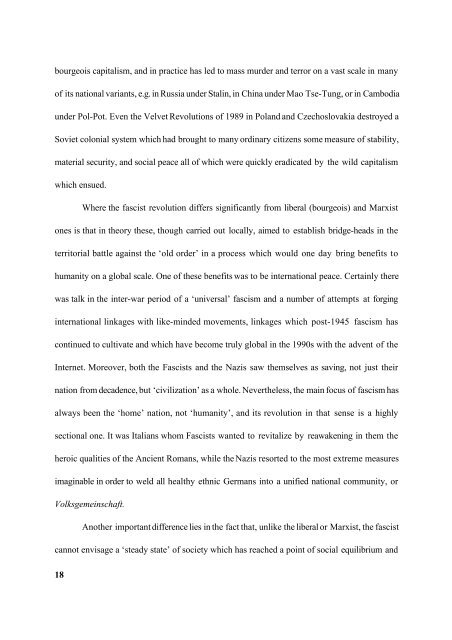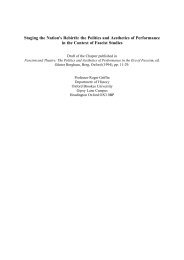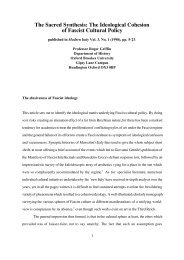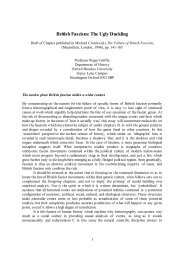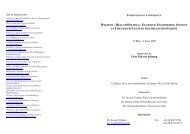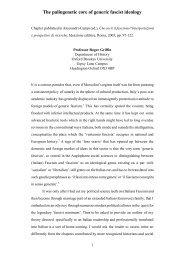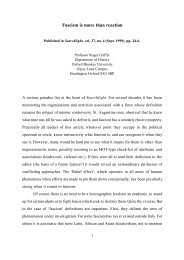Revolution from the Right: Fascism - School of Arts and Humanities ...
Revolution from the Right: Fascism - School of Arts and Humanities ...
Revolution from the Right: Fascism - School of Arts and Humanities ...
Create successful ePaper yourself
Turn your PDF publications into a flip-book with our unique Google optimized e-Paper software.
ourgeois capitalism, <strong>and</strong> in practice has led to mass murder <strong>and</strong> terror on a vast scale in many<br />
<strong>of</strong> its national variants, e.g. in Russia under Stalin, in China under Mao Tse-Tung, or in Cambodia<br />
under Pol-Pot. Even <strong>the</strong> Velvet <strong>Revolution</strong>s <strong>of</strong> 1989 in Pol<strong>and</strong> <strong>and</strong> Czechoslovakia destroyed a<br />
Soviet colonial system which had brought to many ordinary citizens some measure <strong>of</strong> stability,<br />
material security, <strong>and</strong> social peace all <strong>of</strong> which were quickly eradicated by <strong>the</strong> wild capitalism<br />
which ensued.<br />
18<br />
Where <strong>the</strong> fascist revolution differs significantly <strong>from</strong> liberal (bourgeois) <strong>and</strong> Marxist<br />
ones is that in <strong>the</strong>ory <strong>the</strong>se, though carried out locally, aimed to establish bridge-heads in <strong>the</strong><br />
territorial battle against <strong>the</strong> ‘old order’ in a process which would one day bring benefits to<br />
humanity on a global scale. One <strong>of</strong> <strong>the</strong>se benefits was to be international peace. Certainly <strong>the</strong>re<br />
was talk in <strong>the</strong> inter-war period <strong>of</strong> a ‘universal’ fascism <strong>and</strong> a number <strong>of</strong> attempts at forging<br />
international linkages with like-minded movements, linkages which post-1945 fascism has<br />
continued to cultivate <strong>and</strong> which have become truly global in <strong>the</strong> 1990s with <strong>the</strong> advent <strong>of</strong> <strong>the</strong><br />
Internet. Moreover, both <strong>the</strong> Fascists <strong>and</strong> <strong>the</strong> Nazis saw <strong>the</strong>mselves as saving, not just <strong>the</strong>ir<br />
nation <strong>from</strong> decadence, but ‘civilization’ as a whole. Never<strong>the</strong>less, <strong>the</strong> main focus <strong>of</strong> fascism has<br />
always been <strong>the</strong> ‘home’ nation, not ‘humanity’, <strong>and</strong> its revolution in that sense is a highly<br />
sectional one. It was Italians whom Fascists wanted to revitalize by reawakening in <strong>the</strong>m <strong>the</strong><br />
heroic qualities <strong>of</strong> <strong>the</strong> Ancient Romans, while <strong>the</strong> Nazis resorted to <strong>the</strong> most extreme measures<br />
imaginable in order to weld all healthy ethnic Germans into a unified national community, or<br />
Volksgemeinschaft.<br />
Ano<strong>the</strong>r important difference lies in <strong>the</strong> fact that, unlike <strong>the</strong> liberal or Marxist, <strong>the</strong> fascist<br />
cannot envisage a ‘steady state’ <strong>of</strong> society which has reached a point <strong>of</strong> social equilibrium <strong>and</strong>


